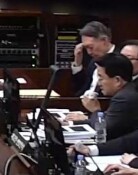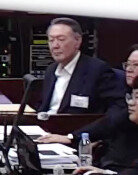Speaking Harsh Language behind the Screen
Speaking Harsh Language behind the Screen
Posted January. 14, 2005 22:52,
Dr. Jekyll and Mr. Hyde is a literary work that is well known for its portrayal of mans dual personality.
Many netizens are like the character in the story, a genial Jekyll in real life but a violent Hyde in cyberspace. Experts point out that this is a problem arising from the fact that the fast development of the Internet led to an equally fast increase in the Internet-using population, but the rules of proper use (netiquette) have not been firmly established yet.
Office worker Ms. Kim (30) recently reported to the police that somebody was constantly writing her malicious comments for no reason on the Internet. Kim, who was a member of an Internet cafe, suffered from stress because of verbally abusive comments such as You XX, are you working for that person? and eventually stopped writing in that cafe.
Last year, Mr. Kim (28) saw some malevolent comments directed towards him during a debate with the members of an Internet site on which he had been active for four years, and after a period of depression due to the stress he experienced during this encounter, he ended up taking his own life.
At the Cyber Defamation and Sexual Violence Dispute Mediation Center, an affiliation of the Information Communication Ethics Committee, around 100 to 200 cases a week are being received for consultation. Seventy to 80 percent of the cases are people who seek aid from the damage caused by defamation or insult.
The slandering comments or abusive language that we write on the Internet for fun may be exerting irreversible pain on somebody else, but this is the reality of out Internet environment.
Internet cultural critic Hong Yoon-sun said, Two characteristics of the Internet are egocentrism and omission of personality, and analyzed, Contrary to Internet shopping or banking, in which there is no need for the intervention of personality, a proliferation of verbal abuse, cursing, and defamation is inevitable in personality-involved cases such as chatting sites or bulletins.
Hong said, As much as our society has united with the propensity of cyberspace and as we are already moving towards an egocentric and emotional society, we should not just hold simple campaigns on cyber culture; we need a social movement aimed at recovering our sense of community.
Since last April, Munrae Elementary School in Seoul has been conducting media education once a week during class and special activity periods. Students learn the term netiquette and the 10 netiquette rules during the lessons. The students get to make chatiquettes themselves, such as, Do not send bomb messages, Do not use chatting language, or Do not curse, and practice them in real life.
Yoon So-young, who is in charge of media education at the school, said, After the children had a discussion about what made them feel bad when chatting or posting messages on the Internet, they seemed to be more cautious about manners when meeting friends, whether on the Internet or in person.
A movement aimed at enhancing the quality of Internet use is active in various organs including the Information Communication Ethics Committee (www.icec.or.kr), Cyber Crime and Cyber Parents. Seven universities, such as Sungkyunkwan University and Dankook University, are planning to add Internet Ethics as an elective for next semester.
Professor Cho Sung-ho of Hanshin University pointed out, Establishing ethics in the cyber world is not a matter that can be solved by establishing a law or by strengthening education. Rather, we need a nationwide movement that says Let us take responsibility for our expressions.
Yi-Young Cho lycho@donga.com crystal@donga.com







